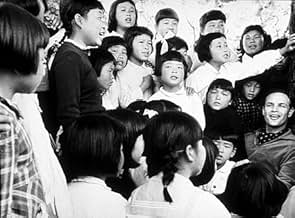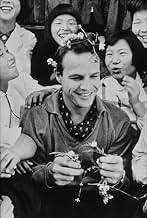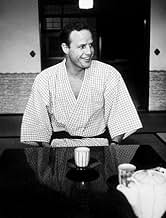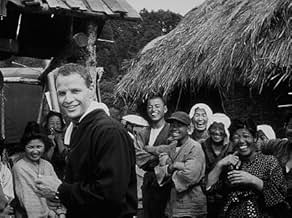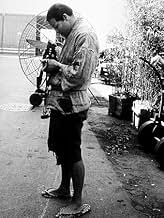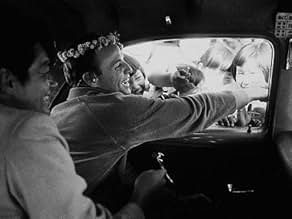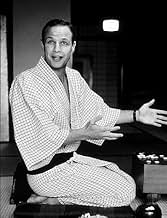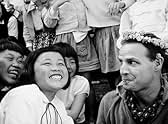VALUTAZIONE IMDb
6,6/10
3976
LA TUA VALUTAZIONE
Aggiungi una trama nella tua linguaIn post-WWII Japan, an American captain is brought in to help build a school, but the locals want a teahouse instead.In post-WWII Japan, an American captain is brought in to help build a school, but the locals want a teahouse instead.In post-WWII Japan, an American captain is brought in to help build a school, but the locals want a teahouse instead.
- Premi
- 1 vittoria e 9 candidature totali
Machiko Kyô
- Lotus Blossom
- (as Machiko Kyo)
Harry Morgan
- Sgt. Gregovich
- (as Henry {Harry} Morgan)
Carlo Fiore
- Soldier
- (non citato nei titoli originali)
John Grayson
- Soldier
- (non citato nei titoli originali)
Harry Harvey Jr.
- Soldier
- (non citato nei titoli originali)
Miyoshi Jingu
- Old Woman on Jeep
- (non citato nei titoli originali)
Roger McGee
- Soldier
- (non citato nei titoli originali)
Dansho Miyazaki
- Sumata's Father
- (non citato nei titoli originali)
Minoru Nishida
- Mr. Sumata
- (non citato nei titoli originali)
Aya Oyama
- Daughter on Jeep
- (non citato nei titoli originali)
Recensioni in evidenza
If you're not a fan of Glenn Ford's westerns, and you think he's merely an ordinary everyman, check out his timed perfection in The Teahouse of the August Moon. With such great talent, it's a wonder Jack Lemmon rose to stardom so quickly. Glenn has all the hesitation, stammering, exasperation, and desire to fix that it takes to be a comic genius. If the first time around, you don't catch all his jokes, don't worry. You were just laughing so hard, you couldn't keep up with the fast pace.
Every time I watch this delightful gem, I laugh myself sick. It does have a long running time, but it certainly goes by quickly. Glenn Ford's character is stationed in Okinawa after WWII, to oversee reconstruction and the wellbeing of the Japanese people. But in his mission to spread democracy, he's completely clueless in his new environment. Marlon Brando plays the scene-stealing Sakini, a Japanese interpreter who winks at and nudges the audience when he wants to make an inside joke. But even with an interpreter, Glenn still finds himself getting into one misunderstanding after another.
While it's seen as "white washing" by today's standards, Marlon Brando didn't intend for his performance to be offensive. In fact, he lived in a nearby Japanese village for four months to absorb the mannerisms, accent, and mentality of the local people. I found his portrayal of the savvy interpreter to be flawless; not only that, but I couldn't find any trace of his usual expressions or gestures. He completely transformed himself.
The story is heartwarming, funny, smart, and bittersweet. From Eddie Albert's obsession with soil and worms to Machiko Kyo's touching tea ceremony, this 1956 comedy is a one-of-a-kind gem with countless delightful moments.
Every time I watch this delightful gem, I laugh myself sick. It does have a long running time, but it certainly goes by quickly. Glenn Ford's character is stationed in Okinawa after WWII, to oversee reconstruction and the wellbeing of the Japanese people. But in his mission to spread democracy, he's completely clueless in his new environment. Marlon Brando plays the scene-stealing Sakini, a Japanese interpreter who winks at and nudges the audience when he wants to make an inside joke. But even with an interpreter, Glenn still finds himself getting into one misunderstanding after another.
While it's seen as "white washing" by today's standards, Marlon Brando didn't intend for his performance to be offensive. In fact, he lived in a nearby Japanese village for four months to absorb the mannerisms, accent, and mentality of the local people. I found his portrayal of the savvy interpreter to be flawless; not only that, but I couldn't find any trace of his usual expressions or gestures. He completely transformed himself.
The story is heartwarming, funny, smart, and bittersweet. From Eddie Albert's obsession with soil and worms to Machiko Kyo's touching tea ceremony, this 1956 comedy is a one-of-a-kind gem with countless delightful moments.
This film made me realize how much we've lost as a country since the 1950s. According to Wikipedia at least, the book, play, and film were enormously popular for about 25 years, when political correctness set in, and liberals were oh-so-terribly aghast at Marlon Brando playing an Okinawan with a heavy accent. But it's Brando's character who is the most admirable in the movie -- sharp, perceptive, and cunning, but also warm, generous, and forgiving.
All told, it's the Okinawans who come off well -- it is we Americans who seem rather ridiculous, with our notions of winning hearts and minds and spreading democracy. Remember that this film was made just ten years after WWII, when we were up against the Soviet Union, and democracy and "the American way" were at the heart of what we thought we were all about. But here is a film that completely satirizes, if not ridicules, all that, and yet it was enormously popular.
Perhaps I'm looking at it through rose-tinted lenses -- there may well have been the Michael Savages and Rush Limbaughs of the day who inveighed against the Hollywood liberals seeking to undermine American resolve in the face of the Soviet threat and disgracing the memory of those who had died in WWII.
But I think, more accurately, it was a time of greater American self- confidence, when we were able to laugh at ourselves more easily, and weren't terrified that this, that or another group might be ticked off.
In short, this is a wise movie that should be seen by all those in power who have anything to do with how we conduct ourselves toward other nations and peoples -- as well as anyone who wants to see an entertaining but also educational film.
All told, it's the Okinawans who come off well -- it is we Americans who seem rather ridiculous, with our notions of winning hearts and minds and spreading democracy. Remember that this film was made just ten years after WWII, when we were up against the Soviet Union, and democracy and "the American way" were at the heart of what we thought we were all about. But here is a film that completely satirizes, if not ridicules, all that, and yet it was enormously popular.
Perhaps I'm looking at it through rose-tinted lenses -- there may well have been the Michael Savages and Rush Limbaughs of the day who inveighed against the Hollywood liberals seeking to undermine American resolve in the face of the Soviet threat and disgracing the memory of those who had died in WWII.
But I think, more accurately, it was a time of greater American self- confidence, when we were able to laugh at ourselves more easily, and weren't terrified that this, that or another group might be ticked off.
In short, this is a wise movie that should be seen by all those in power who have anything to do with how we conduct ourselves toward other nations and peoples -- as well as anyone who wants to see an entertaining but also educational film.
In watching "Teahouse of the August Moon," again recently, I can see how it made such a smash on Broadway. Besides its very funny plot and script, the setting seems ideal for a stage. Or, did they move the stage setting to Japan or elsewhere for the movie? I ask that because after three viewings over the years, the thought has stuck in my mind that it seemed like it was on stage. Perhaps the final scene when we see Sakini directing the locals to reassemble the teahouse drove that thought more than anything. I performed and worked in theater at the college level, and it struck me as a beautiful job of a change of sets and scenery.
The further we get away from the 20th century war years, the less humorous some of the spoofs of military management seem to be. I may have found this film much funnier years ago, but it seems to me now to be just OK or good. This is a comedy of situations, not witty dialog. And, its humor derives to a great extent from the variety of characters. But for one, I could have rated it a notch or two higher.
Glenn Ford just does not deliver the humor in his role as Capt. Fisby. He moves between a hapless, seemingly lazy guy who has lots of bad luck, to a frenetic, nervous character who's worried about doing things right. Then, he becomes a very laid back, un-excitable character who doesn't seem like anything will ruffle him. It just doesn't seem to work. The right actor might be able to deliver that, but it doesn't work for Ford. And, that's too bad, because as one of the two main leads, his character is a great part of the film. I know Ford was capable of great acting, but his interpretation for this role misses the mark.
Now, what earns the film seven stars from me are three performances and the local extras. Marlon Brando is excellent as Sakini, Eddie Albert is fantastic as Capt. McLean, and Paul Ford is superb as Col. Purdy. Purdy and McLean are the sources of most of the funny streaks of this film. We see a good contrast in how Albert transforms from the straight-laced psychologist to the giddy gardener. It works beautifully for him, and he is superb in that role. Paul Ford is a wonderful character actor who plays bombastic buffoons with bravado. And, Brando is excellent as the wonderful interpreter whom we know translates things to come out his way. His opening dialog is very good – in Oriental theatre style, he is the narrator who gives the story's background and sets the stage, so to speak.
Films in which white actors play other races draw the ire of some people yet today. If they are derogatory of the race or character, they surely should be criticized. But, otherwise not. Because this is theater (on stage or on film), and that is part of what acting is all about. Making one's self into another character or person, of whatever age, race, physical condition, mental state or appearance – is a hallmark of acting. To aspiring thespians or established actors, the challenge of a different or demanding role is energizing. I played Hsieh Ping-Kuei in a college production of "Lady Precious Stream" by Chinese playwright and director S.I. Hsiung. Mr. Hsiung went to London in 1932 to pursue post- graduate studies of Shakespeare. Shortly after his arrival, he wrote Lady Precious Stream in English, adapting it from his Chinese culture. It was a huge success, running for 1,000 performances in 1935 and 1936 at the People's National Theatre of London. Its cast was all Caucasian, and in 1936 it moved to Broadway in the U.S. where is success continued. It was made into movies in England in 1938 and 1950, adapted by Hsiung, again with Caucasian casts.
I should like to see someone make a movie of "Lady Precious Stream" shot on location with the full original script. It could be with Asians in all the roles, or it could include a mix if one or more Western stars wanted to tackle a Chinese role. I think many Western audiences today would enjoy it immensely. The story is a romantic, sometimes comic, domestic drama set in a time of instability during the Tang Dynasty.
In the meantime, "Teahouse of the August Moon" can entertain as a comic look at U.S. military management in a conquered country whose culture is much different from that of America.
The further we get away from the 20th century war years, the less humorous some of the spoofs of military management seem to be. I may have found this film much funnier years ago, but it seems to me now to be just OK or good. This is a comedy of situations, not witty dialog. And, its humor derives to a great extent from the variety of characters. But for one, I could have rated it a notch or two higher.
Glenn Ford just does not deliver the humor in his role as Capt. Fisby. He moves between a hapless, seemingly lazy guy who has lots of bad luck, to a frenetic, nervous character who's worried about doing things right. Then, he becomes a very laid back, un-excitable character who doesn't seem like anything will ruffle him. It just doesn't seem to work. The right actor might be able to deliver that, but it doesn't work for Ford. And, that's too bad, because as one of the two main leads, his character is a great part of the film. I know Ford was capable of great acting, but his interpretation for this role misses the mark.
Now, what earns the film seven stars from me are three performances and the local extras. Marlon Brando is excellent as Sakini, Eddie Albert is fantastic as Capt. McLean, and Paul Ford is superb as Col. Purdy. Purdy and McLean are the sources of most of the funny streaks of this film. We see a good contrast in how Albert transforms from the straight-laced psychologist to the giddy gardener. It works beautifully for him, and he is superb in that role. Paul Ford is a wonderful character actor who plays bombastic buffoons with bravado. And, Brando is excellent as the wonderful interpreter whom we know translates things to come out his way. His opening dialog is very good – in Oriental theatre style, he is the narrator who gives the story's background and sets the stage, so to speak.
Films in which white actors play other races draw the ire of some people yet today. If they are derogatory of the race or character, they surely should be criticized. But, otherwise not. Because this is theater (on stage or on film), and that is part of what acting is all about. Making one's self into another character or person, of whatever age, race, physical condition, mental state or appearance – is a hallmark of acting. To aspiring thespians or established actors, the challenge of a different or demanding role is energizing. I played Hsieh Ping-Kuei in a college production of "Lady Precious Stream" by Chinese playwright and director S.I. Hsiung. Mr. Hsiung went to London in 1932 to pursue post- graduate studies of Shakespeare. Shortly after his arrival, he wrote Lady Precious Stream in English, adapting it from his Chinese culture. It was a huge success, running for 1,000 performances in 1935 and 1936 at the People's National Theatre of London. Its cast was all Caucasian, and in 1936 it moved to Broadway in the U.S. where is success continued. It was made into movies in England in 1938 and 1950, adapted by Hsiung, again with Caucasian casts.
I should like to see someone make a movie of "Lady Precious Stream" shot on location with the full original script. It could be with Asians in all the roles, or it could include a mix if one or more Western stars wanted to tackle a Chinese role. I think many Western audiences today would enjoy it immensely. The story is a romantic, sometimes comic, domestic drama set in a time of instability during the Tang Dynasty.
In the meantime, "Teahouse of the August Moon" can entertain as a comic look at U.S. military management in a conquered country whose culture is much different from that of America.
Casting Marlon Brando in this film as Sakini, a Japanese interpreter for American troops in post WW-II Japan is considered by many critics and film historians alike as one of the worst casting errors ever made in a film history. In my opinion, though, Marlon Brando is the one responsible for turning this quite an average film into a hillarious comedy. Yes, they really did it. With a little bit of make up and great effort from actor's part to learn Japanese mannerism and language in order to get an accent in his speech we have here Marlon Brando in his most unimaginable role. The rest of the cast is also quite good, namely Paul Ford as Colonel Waiwright Purdy III, a somehow cliche figure of stubborn, narrow minded US military officer and Glenn Ford by his side as Captain Fisby, for whom Brando's character Sakini ends up working as an interpreter and, of cause, unforgettable Machiko Kyo, as a spirited geisha, whom lovers of Japanese cinema must remember from Akira Kurosawa's films.
Directed by Daniel Mann (Butterfield 8, Come Back, Little Sheba) and based on John Patrick's stage play that was a big hit on Broadway at it's time, The Teahouse of the August Moon is slow in parts and in terms of some aspects of the story considerably aged and outdated but still funny and entertaining movie. 8/10
Directed by Daniel Mann (Butterfield 8, Come Back, Little Sheba) and based on John Patrick's stage play that was a big hit on Broadway at it's time, The Teahouse of the August Moon is slow in parts and in terms of some aspects of the story considerably aged and outdated but still funny and entertaining movie. 8/10
Marlon Brando stars as a Japanese interpreter and Glenn Ford plays a captain who has been in almost every branch in the military. Ford is ordered to go to a Japanese village to teach the people about democracy and to build a schoolhouse in the shape of the pentagon. The Japanese are only interested in building a teahouse and their isn't enough money to build both. The Japanese try to sell some homemade stuff but it won't sell until Ford finds out that they also make brandy. The military can't get enough brandy, so they build a teahouse instead of a schoolhouse. The military don't like what Ford is doing so they send a psychiatrist but he ends up helping them out instead. I thought Glenn Ford was great here and Brando also did a good job.
Lo sapevi?
- QuizProduction began with Louis Calhern playing Col. Purdy, but Calhern died after more than a month of filming. Paul Ford was quickly recruited, as he had created the role on Broadway, and this resulted a revived career for the lovable, irascible character actor.
- BlooperWhile Fisby and Sakini are finishing up their first address to the villagers Sakini asks Fisby what time it is. He responds that it's a quarter to 5:00. But the sun is directly over their heads as if it were noon.
- ConnessioniFeatured in Okinawa: Keystone of the Pacific (1973)
- Colonne sonoreSakura Sakura (Cherry Blossoms)
(uncredited)
Written and Arranged by Kikuko Kanai
Sung by Lotus Blossom
I più visti
Accedi per valutare e creare un elenco di titoli salvati per ottenere consigli personalizzati
Dettagli
- Data di uscita
- Paese di origine
- Lingue
- Celebre anche come
- The Teahouse of the August Moon
- Luoghi delle riprese
- Azienda produttrice
- Vedi altri crediti dell’azienda su IMDbPro
Botteghino
- Budget
- 3.926.000 USD (previsto)
- Tempo di esecuzione
- 2h 3min(123 min)
- Mix di suoni
Contribuisci a questa pagina
Suggerisci una modifica o aggiungi i contenuti mancanti


